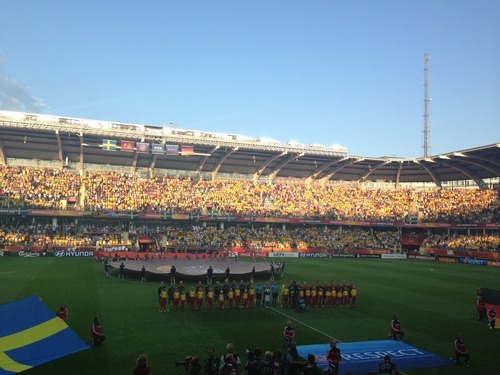I returned to Sweden from my summer break just a day before the opening games of Euro 2013. During the tournament, I was able to take in three games live and watched most of the rest on TV. Since all the commentary was in Swedish, and I’m removed from what’s being said about the tournament in the U.S., I developed some opinions on the action that may or may not be shared by a lot of people.

- Sweden is awesome. Something that has really amazed me and pleasantly surprised me since coming to Sweden is the country’s respect for women’s sports. Newspapers feature articles on the local teams, TV covers a lot of games, and fan support is impressive. While most times there aren’t tons of people in the stands for club games, everyone around the city is aware of their local team. I was lucky enough to be in Göteborg for two games that featured Sweden and all day the city was filled with yellow and blue shirts. Both games sold out the stadium and had an attendance over 16,000 supportive fans proudly chanting and waving Swedish flags. The championship game, although Sweden was no longer involved, had a record attendance of 41,301. I’m not Swedish, but was sure proud to be a temporary resident of a country that appreciates and supports their women’s fotboll.
- The gap is closing. What struck me most about the entire Euro 2013 tournament was the fact that no victory was ensured. In the past, it would be a no-brainer that Germany would crush Holland, England would run easily over Spain, and France would glide past Denmark in a quarterfinal game (all results that did not pan out). But while the top teams continue to rise and refine their system of play, everyone else is closing the gap with leaps and bounds. Denmark, who did not finish top two in their group play but received a wildcard into the quarterfinal, impressed me as much as any team I watched in the tournament. Norway, currently ranked 11th in the world by FIFA, surpassed three higher-ranking European sides to feature in the final. For periods of the match I thought they outplayed Germany and easily could have taken the championship had they capitalized on the two penalties called in their favor. All in all, no team in the tournament could be counted out. All showed very bright moments and made a case for the increasing parity in the women’s game.
- Spain is to be feared. My personal favorites to watch this tournament (and I know I’m not alone is saying this) were Spain. I often face Verónica Boquete and Jennifer Hermoso, who play for my Swedish club’s rivals, Tyresö FF, so I am aware of their extraordinary individual talent. What surprised me was how well Spain played as a team. Not only do they have individuals who can break pressure and create a dangerous situation in a split second, but they move the ball well and with good rhythm. I had no illusions about how far they would go in the tournament. I don’t think they have the depth or physical strength yet to push through the later rounds against tough competition. But Spain is to be feared in years to come. They are a few players away from being one of the top teams in Europe and as they gain confidence and eventually increased resources and support from their federation, I think they have the potential to challenge as a top team in the world.
- Winning is a habit. Everyone had been talking about how Germany had injuries and was missing some top players leading into the tournament. They brought a younger team than usual and were visibly not the same powerhouse we’re used to seeing. I thought that Sweden outplayed them in the semifinal in the run of play, but were unfortunate to not do better finishing some chances on goal. And Norway could have easily been victorious based on their chances in the final. But Germany know how to win. It is an intangible skill in the game that has nothing to do with possessing the ball, creating quality scoring chances, or even the talent of the individual players. Yes, these factors are all important and it is very unlikely that you can win a major competition without them, but Germany was not the best team in Euro 2013 in my opinion. They just know how to win when it counts. They expect to win, they practice winning, and they come up big in the important moments. There is something to be said for that. It isn’t always the best team that comes through in the end, but the team who believes they deserve to be the best.
- Global coverage has improved in leaps and bounds. Players from both England and Holland (places with very strong traditions on the men’s side of the game) commented on much they felt coverage of the tournament had improved back home. Everywhere, the women’s game is gaining respect and being analyzed tactically and technically in similar ways to the men’s. The ability to follow the games from outside of Sweden was also impressive. In the U.S., all games were shown on ESPN3. I could be wrong, but I don’t remember being able to watch them in 2009.
I found myself very jealous that the U.S. does not have an equivalent tournament to the Euros. I think that a major competition in addition to the Women’s World Cup and Olympics is incredibly valuable for the countries and individuals who participate. New heroes emerge, individual players get exposure at the international level and to top club scouts from around the world, and it is another chance to compete for a prestigious title. Maybe we can apply for honorary European status??